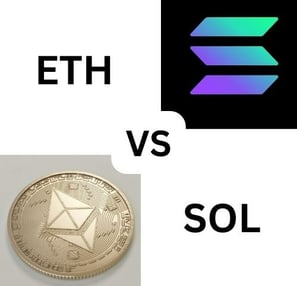Ethereum Versus Solana: Do We Need Both?
An Exploration into the Use Cases of Ethereum and Solana
3/19/20244 min read


When it comes to cryptocurrencies, Ethereum and Solana are two prominent names that often come up in discussions. Both platforms offer unique features and capabilities, but do we really need both? In this article, we will explore the differences between Ethereum and Solana, their use cases, and why having both ecosystems can be beneficial for the crypto space.
Understanding Ethereum and Solana
Ethereum, often referred to as the pioneer of smart contracts, is a decentralized platform that enables developers to build and deploy decentralized applications (dApps). It introduced the concept of programmable blockchain, allowing developers to create smart contracts that automatically execute predefined actions when certain conditions are met. Ethereum's native cryptocurrency is called Ether (ETH), and it is used to power transactions and pay for computational resources on the network.
Solana, on the other hand, is a relatively newer blockchain platform that aims to provide high-speed and low-cost transactions. It utilizes a unique consensus mechanism called Proof of History (PoH), which timestamps transactions before they are added to the blockchain. This approach allows Solana to achieve impressive scalability and throughput, making it suitable for applications that require fast and efficient processing. Solana's native cryptocurrency is called SOL, and it serves as the fuel for transactions and network operations.
The Advantages of Ethereum
Ethereum has established itself as the go-to platform for decentralized applications and the development of new blockchain projects. Its robust ecosystem, widespread adoption, and strong community make it a reliable choice for developers and users alike. Here are some key advantages of Ethereum:
Smart Contract Functionality: Ethereum's support for smart contracts enables the creation of self-executing agreements without the need for intermediaries. This functionality has paved the way for various use cases, including decentralized finance (DeFi), non-fungible tokens (NFTs), and decentralized exchanges (DEXs).
Network Effects: Ethereum benefits from its large and diverse community of developers, users, and projects. This network effect creates a virtuous cycle where more participants join the ecosystem, leading to increased innovation, liquidity, and overall growth.
Decentralization: Ethereum is known for its commitment to decentralization and censorship resistance. Its open and permissionless nature allows anyone to participate in the network, making it difficult for any single entity to control or manipulate the platform.
The Strengths of Solana
Solana offers a different set of strengths that make it a compelling choice for certain use cases. Its focus on scalability and speed has positioned it as a potential competitor to Ethereum. Here are some advantages of Solana:
High Throughput: Solana's unique consensus mechanism and architecture enable it to process thousands of transactions per second, significantly surpassing Ethereum's current capacity. This scalability makes Solana suitable for applications that require fast and near-instantaneous transaction finality.
Low Transaction Fees: Solana's efficient design allows it to offer low transaction fees, which can be particularly appealing for projects that require frequent transactions or micropayments. This cost-effectiveness makes Solana an attractive option for developers and users looking to minimize transaction costs.
Developer-Friendly: Solana provides a developer-friendly environment with extensive documentation, tooling, and support. Its compatibility with the Ethereum Virtual Machine (EVM) allows developers to port their existing Ethereum-based projects to Solana with relative ease.
Use Cases and Differentiation
While Ethereum and Solana share some similarities, they also have distinct characteristics that make them suitable for different use cases. Ethereum's established ecosystem and wide range of dApps make it ideal for projects in the DeFi, NFT, and DEX spaces. Its smart contract functionality and network effects provide a solid foundation for innovation and growth.
On the other hand, Solana's high throughput and low transaction fees make it well-suited for applications that require fast and cost-effective transactions. It can be particularly beneficial for projects involving high-frequency trading, gaming, decentralized exchanges, and real-time data processing.
It's important to note that the choice between Ethereum and Solana ultimately depends on the specific requirements of the project or application. Some projects may find value in leveraging the existing Ethereum ecosystem, while others may prioritize speed and cost-efficiency offered by Solana.
The Benefits of Having Both
Instead of viewing Ethereum and Solana as direct competitors, it is more productive to see them as complementary platforms that offer different strengths. Having both ecosystems in the crypto space provides users and developers with more options and flexibility.
For developers, having access to both Ethereum and Solana allows them to choose the platform that best suits their specific needs. They can leverage Ethereum's well-established ecosystem for certain use cases, while utilizing Solana's scalability and low fees for others. This flexibility encourages innovation and fosters healthy competition between the two platforms.
From a user perspective, having multiple blockchain platforms ensures that they are not locked into a single ecosystem. It provides them with the freedom to choose applications and services that align with their preferences, whether it's the security and decentralization of Ethereum or the speed and cost-effectiveness of Solana.
Conclusion
Ethereum and Solana are both significant players in the crypto space, each offering unique features and advantages. While Ethereum has established itself as the leading platform for decentralized applications, Solana's focus on scalability and speed makes it a compelling alternative.
Ultimately, the decision to use Ethereum, Solana, or both depends on the specific requirements of the project or application. By having both ecosystems available, developers and users can benefit from the strengths of each platform, fostering innovation and driving the growth of the crypto space as a whole.
